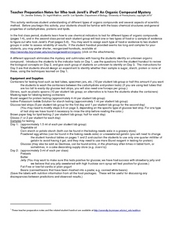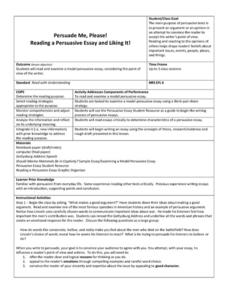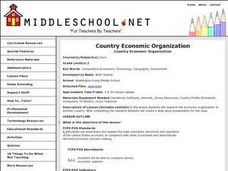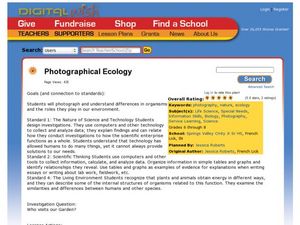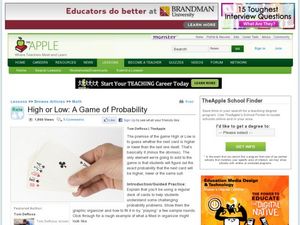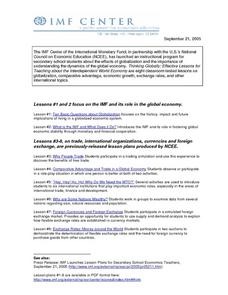Curated OER
Learn Basic Polish Verb Infinitives
In this Polish verb infinitives worksheet, students use the graphic organizer to study 43 Polish infinitive verbs. The Polish and English verbs are also shown on table.
Science Matters
Blubber Gloves: It’s All About Insulation
Instill the concept of adaptation with the help of Blubber Gloves—ziplock bags, shortening, and duct tape. Scholars discuss how animals and plants keep warm in polar regions, record their predictions, and try on their Blubber Gloves to...
Curated OER
“The Story of an Hour” Extension Activities: Teacher’s Guide and Notes
Enhance and extend instruction of "The Story of an Hour" by Kate Chopin with one or all of these ideas. You might want to cover characterization and summary, or improve understanding of context clues and irony. You can cover any...
K12 Reader
Bartering for Basics
A passage about bartering practiced by early Native American tribes provides the text for a reading comprehension worksheet that asks kids to use information from the article to answer a series of comprehension questions.
Teach Engineering
Blood Pressure Basics
Under pressure! The second lesson of the series introduces the class to blood pressure and the impact of high blood pressure on the cardiovascular system. It helps learners make the connection between blood pressure and how the heart...
Science Matters
Lotusland
It's time for a field trip! Scholars take their new-found knowledge of adaptations and seed dispersal on a field trip to a local botanical garden. They gain an up-close look at how ecological interdependence works in a distinct...
Curated OER
Great Gravity, Batman!
Eleventh graders are introduced to the effect of gravity on plant growth. They describe the major processes and mechanisms by which plants grow, develop, and supply various products, including energy and nutrition, needed by other...
Curated OER
The Soil Chain
Fourth graders show the needs of plants met by soil. In this Science lesson, 4th graders detail the components of soil and determine which are living or once living and non-living. Students determine the needs of plant growth that are...
Curated OER
Who Took Jerell's iPod?
Students investigate various substances to determine the perpetrator of a crime. In this biology lesson, students test for the presence of organic compounds in various samples. They identify an unknown substance based on its physical and...
ReadWriteThink
Literature Circles: Getting Started
Make reading more enjoyable and interactive with literature circles! Here you'll find detailed lessons to begin the literature circle process. Ten lessons introduce each role learners take on. Literature circle roles include...
Curated OER
Bacteria
Students study the advantages and disadvantages of bacteria. In this bacteria lesson students draw and label the different types of bacteria.
Discovery Education
Discovering Math: Beginning Measurement
Weight, time, length, cost, and mass are all things we can measure. Learners are introduced to the concepts they'll need to know before embarking on any measurement adventure. They are introduced to each type of measurement and types of...
Middle School Computer Projects
Timeline of Your Life
Pupils can use PowerPoint as a tool to create clear timelines that show their lives in relationship to historical events. Take a trip to the computer lab and share this page with your class. Class members can watch each video and follow...
Curated OER
Persuade Me, Please! Reading a Persuasive Essay and Liking It!
Persuade your writers that crafting arguments is not that difficult. They only need to follow the steps outlined in this resource.
Curated OER
Endangered Organism Project
Students examine how different organisms meet the characteristics of life. They study specific endangered species and what caused their endangerment. They vcomplete a power point research project.
Curated OER
Country Economic Organization
Eighth graders research the economic systems and organization of another country. They prepare a PowerPoint presentation for the class showcasing their findings.
Curated OER
Who Needs a Dress Code?
Students create a poster showing examples of appropriate and inappropriate student grooming and attire. They write comments explaining the need for each rule.
Curated OER
Photographical Ecology
Learners study organisms and the roles they play in nature. In this ecology lesson, students photograph several examples of organisms during a nature walk. Learners print out their photos and classify the organisms as plants or animals.
Curated OER
Comprehension of Word Problems
Learners solve word problems using a graphic organizer. In this problem solving lesson, students are introduced to the included graphic organizer and are taught how to use it for solving word problems. Learners write the required...
Curated OER
High or Low- Probability
Students use playing cards to examine probability. In this probability lesson plan, students work in groups with a deck of cards and predict if the next card they lay down will be high or low. Students fill out a graphic organizer with...
Curated OER
Basic Infosec
Sixth graders identify similarities between home security and computer (or information) security. In this information security lesson, 6th graders create their own secure folders using passwords on the computer to organize their files...
Curated OER
Hey, Hey! Ho, Ho! Why Do We Need the WTO?
Students participate in various hand-on activities as they study six international institutions that play important economic roles in the areas of international trade and finance.
Curated OER
Basic Ideas of Inheritance
Students enter personal information into a database. The information is used to reinforce the ideas of inheritance that is found in 1st Grade Science. Access to technology is essential for this lesson. Adding the use of a mirror for...
Utah Education Network (UEN)
Classical Appeals and War Speeches
Discuss classical appeals of rhetoric through the speeches of Winston Churchill and FDR. Learners read, annotate, and analyze the speeches by the men before using a graphic organizer to track the use of ethos, pathos, and logos.










